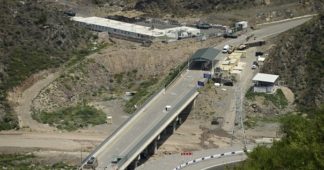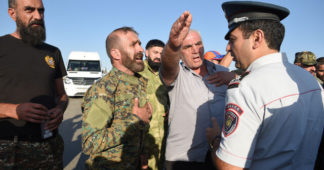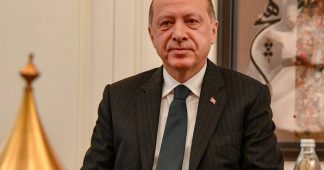Azerbaijan and Turkey set their sights on Armenia.
By James W. Carden
YEREVAN—Atop a high hill, just west of Yerevan’s old city, stands a stark, deeply affecting monument marking the Ottoman Empire’s 1915 genocide of 1.5 million Armenians. The world Armenia inhabits is once again taking on a tragic color: Last month, to what might charitably described as a muted international response, Azerbaijan, Turkey’s closest ally in the region, achieved its long-cherished goal of ridding the Nagorno-Karabakh enclave of its ancient Christian community after a 9-month blockade that deprived its 120,000 residents of food, fuel, and medical supplies.
In the aftermath of the Second World War, Raphael Lemkin, a law professor and refugee from Nazi-occupied Europe, through a tremendous force of will, conceived, wrote, and lobbied the United Nations to adopt the Convention on the Prevention and Punishment of the Crime of Genocide. Lemkin, who invented the term genocide, defined it as “a coordinated plan of different actions aiming at the destruction of essential foundations of the life of national groups, with the aim of annihilating the groups themselves.”
What happened to the Armenians of Nagorno-Karabakh is undoubtedly then a case of genocide by the longtime Islamist dictator of Azerbaijan, Ilham Aliyev. And while pushed from the minds of policymakers in Washington thanks to recent events in Gaza, last week GOP hopeful Vivek Ramaswamy was one of the few candidates running for president to acknowledge that what happened in Nagorno-Karabakh is “probably the most under-appreciated atrocity in the world.”
And he’s not wrong: the Biden administration, distracted by its various and sundry overseas projects, including funding and overseeing a war against nuclear-armed Russia in Ukraine and now aiding and abetting the Israeli war on Gaza, met the news with a few strong statements and not much else.
Yet there seems more to come for Armenia—and little interest in the West in doing anything to prevent it.
The next target of Aliyev’s is likely the southern Armenian province of Syunik, which, if taken by force, as seems to be the plan, would create a land corridor (also known as the Zangezur Corridor) that would connect Azerbaijan proper to its western Nakhchivan enclave. Nakhchivan borders Turkey, and thus would create a profitable connection between the two allies.
It isn’t as if Azerbaijan and its powerful Turkish patron are making any secret of their plan to invade and annex sovereign Armenian territory. In December 2022, Aliyev flatly proclaimed that “present-day Armenia is our land.” The months that followed he went on to declare that “we are implementing the Zangezur corridor, whether Armenia likes it or not.” For his part, Aliyev’s patron, the Islamist Erdogan, praised the ethnic cleansing, describing it as “an operation” that was “completed in a short period of time, with utmost sensitivity to the rights of civilians.”
Things are already underway. Riding a wave of oil revenue, Azerbaijan, which has boosted defense spending to $3.1 billion, is steadily and not-so-stealthily advancing across Armenia’s eastern border.
In any case, it seems likely they’ll get away with it when the time comes. Why? As Luis Moreno-Ocampo, the first chief prosecutor of the International Criminal Court, recently explained,
“Azerbaijan is an ally with the West against Iran; it provides energy to Europe and it spends millions on sophisticated Israeli weapons. But such exigencies must not get in the way of the world’s responsibility to stop what is happening before its very eyes: the Armenian genocide of 2023.”
As if that weren’t enough, Armenia has been cursed with pusillanimous leadership in the form of a Soros-backed politician named Nikol Pashinyan. Pashinyan, who has served as prime minister since 2018, has what might be described as an almost “Anti-Midas” touch. In the space of five years he has managed to alienate his country’s principal great power supporter, Russia, all the while signaling weakness towards Armenia’s revanchist neighbors, resulting in the loss of Nagorno-Karabakh and very likely, more to come. Dr. Pietro Sharakrian, a postdoctoral fellow at the Higher School of Economics in St. Petersburg, put it starkly: “Pashinyan’s premiership has been a disaster for the Armenian people.”
There exists, more worryingly still, the possibility of a wider regional war should Azerbaijan roll into Syunik. For one, Iran has expressed opposition to such a move and if Russia wraps up its war in Ukraine, the possibility exists that they will be freed up to step in as well. So one shouldn’t rule out a collision involving the major players in the region: Russia, Iran and Turkey.
Sadly, the cruel vicissitudes of history and politics are not yet finished with Armenia.
We remind our readers that publication of articles on our site does not mean that we agree with what is written. Our policy is to publish anything which we consider of interest, so as to assist our readers in forming their opinions. Sometimes we even publish articles with which we totally disagree, since we believe it is important for our readers to be informed on as wide a spectrum of views as possible.











